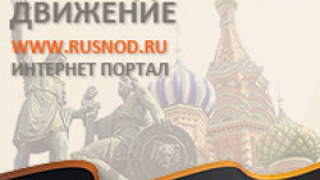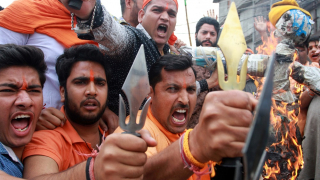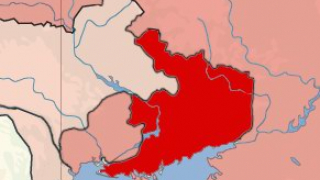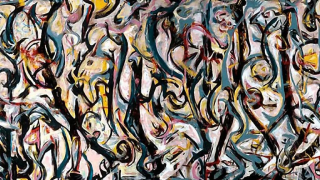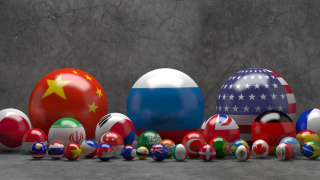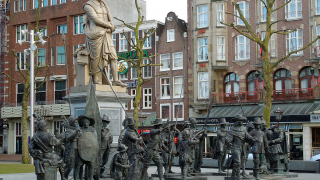Reflections on the Renaissance of Nationalism
This essay began as a book review on „The Virtue of Nationalism“ written by Yoram Hazony, who is a political scientist and president of the Herzl-Institute in Jerusalem. Yet the piece grew well out of a mere review because Hazony account is so penetrating that I couldn’t help expanding on some of the most virulent themes. No doubt this book is something many conservative minds have been waiting for. It goes straight to the heart of tough questions of religion and family, still very controversial in liberal polite society. Hazony like Herzl is a committed Zionist, yet not of the old liberal but the new religious persuasion. As an Israeli he strides virgin territories, seldom touched on in by the European enlightenment, namely the unique world of Oriental clans and tribes - perfectly alien to the Western liberal imagination, yet at the same time appealing for those with an affinity to the Middle East.
A book on the virtues of nationalism could barely have come more timely. It will be read almost certainly with enthusiasm by many eastern Europeans who are constantly chastized by the western media for their post-communist embrace of nationalism, family and religion - a blessed source of identity they have been deprived of for the best part of the last century. But meanwhile in the West too nationalism is back with a vengeance. The new Catalonian quest for independence, rumors about Irish unification, Brexit itself and Trump‘s America First are but the most popular examples. On top of that comes a refreshingly particularist Italian government, hostile to the Germanophile European Empire and instead looking at President Putin for inspiration. The Russian president himself just delivered for his fourth term a state budget with a decisive nationalist flavour literally turning swords into ploughs: he cut defense by 20 % and is keen on chanelling the new cash into domestic infrastructure. By this Vladimir Putin again took the lead among the group of heretical nationalists eager to challeneg liberal globalism in the name of political self-determination.
This is close to what Hazony‘s book is about to promulgate. It is also a rare piece of Israeli communication about risk taking in an experimental political culture. For as a nation Israel is still „in the making“ because after 70 years its right to exist is still regularly being challenged. Personal disclosure: I had the pleasure to live in Jerusalem during 2011 and made the acquaintance of Hazony‘s family. He and his wife Yael, who are both scholars and th the same time raising ten children. There can be little doubt that Hazony‘s book runs against the grain of the liberal consensus in many respects. This makes it extremely stimulating and inspiring for conservatives and a perfect antidot to the pastime of Trump bashing.
Now on the conservative side of the political aisle we have the „particularist turn“ or Catholic retreat, also known as the „Benedict Option“, propagated for quit some time by Rod Dreher in the American Conervative. Yet very few conservatives, I can think only of Roger Scruton, have so far dared like Hazony to add nationalism to the mix of family and religion. Hazony rightly points out the main lesson of WW II, which seems almost forgotten: „It was in the end British, American and Russian nationalism that defeated Germany‘s bid for universal empire.“ Usually we hear the exact opposite narrative: that it was German nationalism that set off WW II. Hazony‘s aim is to convince us that nationalism was not the problem but rather the solution to imperial chauvinism in the 20th century. Hazony describes two rival camps within liberal imperialism: 1) pragmatic or utilitaristic free trade universalists or „economic liberals“, residing in Washington as the centre of military and political power, 2) ideological and rationalistic universalists or „political liberals“, who insist on a peaceful world government granted by international institutions like UN and EU. Both, Hazony argues, are liberal imperialists.
We have to remind everyone of Max Weber‘s diagnosis though that Anglosaxon universalist economic liberalism was born from secular Protestantism, not Catholicism. This begs the question, why did Luther and Calvin had a mission and were obsessed with proselytizing, if they are to be understood as driven by nationalism? Tom some degree at least In the end Protestants continued on the track of centrifugal global Catholicism - driving them away form the centripetal family. Hazony makes an interesting point: the EU after WW II was designed by Conrad Adenauer to prevent Germany from ever becoming strong enough to dominate the rest of Europe ever again - which is nevertheless exactly what has come about in recent decades. But you would rarely read about this paradox in Western newspapers today. Surely Hazony is right in claiming that Luther and Protestantism were the midwifes of nationalism in the German lands and Scandinavia but so was Catholicism in France and the Latin South. Nevertheless Protestant lands paid a high prize for national self-determination in the form of unhinged individualism, whose centripetal pull eventually ruined the family and religion.
Luther famously broke his monastic oath and switched his loyalty and conscience to the state, hence „cuius regio eius religio“ emerged after the 30-Years War. Protestants dislodged conscience from the „truthful“ deed and ritual, already corrupted by Catholic „indulgences“. The Deed is close to custom or Jewish „minhag“: the way of doing things which often does not require much thinking once it has been customized. Hazony pretty much relies on the strength of families, which depends „to a very great degree on this cultural inheritance that the older generations bequeath on the younger ones and on the degree to which this inheritance is successfully handed down.“ He also gives us a definition of loyalty and coherence by stating that the ups and downs of the family, congregation and nation are experienced by its members as if they were happening to them because all this is part of the „extended self“ - as opposed to closeminded liberal individualism.
In a way nationalism depends on substitutes for individual autonomy such as collective self-determination which come with the risk of setting free resentment and chauvinism, Hazony rightly points out. It also meant for people unable or unwilling to leave their ancestors‘ home turf that the dominant religion would be imposed onto them. This infringed on individual conscience and is widely considered as oppressive for it was handing over religious freedom and individual conscience to the powers to be. This birth defect of Protestant nationalism is still with us in the West. It forces hair dressers and bakers to act against their religious identity – clealy an unintended consequence of the „spatial turn“ that separates Protestantism from Judaism.
Forgotten is the horrible Protestant intolerance during the Renaissance and again in the wake of its „cultural turn“ during the second half of the 19th century, when the war against Catholics became tyrannical. Lord Acton meticulously documented the atrocities committed by Protestants from the Reformation onwards, stating that they have been far more intolerant than Catholics, particularly in Germany and England, if less so in the New World. Contrary to this Hazony frequently refers to the „Protestant construction“ as the best we can wish for: „national independance and the biblical moral minimum for legitimate government.“ We can certainly agree with Hazony that a nation state is better than an imperial order of government not to mention the tribal political order with endless infighting. Yet an entirely different issue is the present moral decline being most advanced in Protestant lands. No doubt Hazony is well aware that family matters, treating it as the paradigm for all other human collectives, to which loyalties are owed by individuals. Those can be best measured using the family as template, Hazony maintains, based on criteria like physical flourishing, internal integrity and cultural inheritance.
All the same he equals the individual loyalty to the family to that of the nation, which is certainly a matter of much divergence in advanced Western societies. Israel, where Hazony lives, is in this respect rather the exception than the rule. Regarding national particulars, Hazony observes, no universal ideology „has succeeded in eliminating this intense desire to protect and strengthen the collective ...or even in diminshing it, neither Christianity or Islam, nor liberalism or Marxism“. Inside the fortresses of families, clans and tribes these „are collectives of trust and hotbeds of experimentation, developement and innovation“, which „only later will radiate beyond its borders after it has been probed manifold within the walls“. I regard his defense of a healthy particularism and tradition as one of the best parts of his book.
To his great merit Hazony discards Rousseau‘s myth of the „state of nature“ or that the modern state came into existence by an „orginal contract“ signed by all its citizens. Surely this modern fiction is meant to eclipse the family as the foundation of any society. For Hazony tells us, all civilizations began with families, clans and tribes. The state rests on the foundational „coming together of the heads of tribes“ so that previous foundational theories by Hobbes and Locke fall by the wayside. Who has ever believed that each individual would have been personally asked to give his or her consent? The story on the foundation of states based on long standing family or clan bonds of loyalty and mutual trust is by far more plausible.
Contracts are almost exclusively signed by family and business and actually based on consent such as with marriage. Hazony goes on to make a realistic argument which is fairly little acknowleged: children must get quite mature, meaning at least between 25 and 35 years old in order to understand what parents want them to internalize and preserve for the next generation. He thus makes the case for parental support and advice well beyond of the age of adolescence. In Judaism the purpose of this is that parents enable their offspring to pay back the very inheritance of the previous generation. For if used with prudence it helps them to achieve their goals by sparing them some of the tragic errors that usually set us back for years.
Which brings us back to national vitues and vices. The exceptionally secular Germanosphere, thanks to the Nazis, not only drove the sexual revolution which ruined family and religion, but equally rejected the nation state like no one else by heading for a European Superpower after WW II. Hazony points to a continuity here: „The cause of the First World War was, in other words, the determination of Germany to revive imperialism on the continent, thus ending the European order of national states forever – and the equal determination of Britain to preven this“. The Serbian crisis of 1914, according to the famous thesis by German historian Fritz Fisher in the 1960s, was just an opportunity to unite the slavs under German imperial rule over the continent. Today after seventy years of the liberal fight against nationalism, German global aspirations have succeeded again.
The opposite dynamics have engulfed Israel, Eastern Europa and lately the Anglosphere. A religious renaissance with florishing families, abt to invigorating local communities, fostering the internal integrity of national states together with their cultural heritage. All this draws attention to material prosperity and creates resistence toward global wars by weakening universalist aspirations in politics. This explains the untoward coalition between US president Trump‘s constituency of evangelicals living mostly in the Great Plains with the nationalist majority of Israel. Hazony describes as exceptional episodes the late 19th century American imperialism of Teddy Roosevelt and Woodrow Wilson which saw the conquest of many foreign territories (Philippines, Cuba, Hawaii, Puerto Rico etc), yet did not last longer than Pearl Harbour in 1941. In Europa every Protestant power, just like Catholic Habsburg and France, had its own colonial empire, some lasting well into the 19th century. Only Japan, Germany, and Italy were late comers in the 20th century.
Hazony goes on to argue that collective self-determination enabled by the national state opens up more resources and freedom for all members of tribes and clans while still keeping traditional loyalties. By contrast imperial orders push the centrifugal drive too far and transcend the individual towards unhinged individualism, bent on dropping loyalties to family, clan, tribe and relgion. This is what we are seeing today with the universalist global gender revolution and its aggressive NGOs all of which have a Protestant flavor about them. NGOs are centrifugal and artificial agencies of imperial character whith no loyalties beyond transitory individual alliances. The best example is the Boycott Israel Campaign (BDS) based on intersectionality and increasingly engulfed by anti-Semitism.
The difference between liberals and conservatives, according to Hazony, is methodical: liberal rationalism against conservative empirism. Hazony compiles an impressive list of thinkers in favor of nationalism such as Michael Oakeshott, Thomas Sewell, Gertrude Himmelfarb, Yuval Lewin, Joao Carlos Espada and Anthony Quinton. Those in favor of an international order of competing national states include David Hume, Adam Ferguson, William McDougal, Anthony D. Smith and Pierre Manent. Many are today convinced that „natural law“ has failed the problems of imperial entities such as the European Union. Claims by European leaders to „progressive transnationalism“ are mere window dressing and do not change anything. Hazony also dismantles the myth of the „neutral state“ and sees those principally bent toward an imperial order which means being ruled by others and curbing self-determination of free nations.
Hazony surely favors the establishment of a reasonable order of national states which had historically ermerged after the Peace of Westphalia in 1648 and was embraced by John S. Mill. This was later denounced in Kant‘s famous sketch of 1795 on „Perpetual Peace“. It was only when the aggressive Nazi Empire was cast as „national state“ by liberals that the tide turned against it. One of Hazony‘s most fascinating arguments points to the instrumental paradox which led Western liberals to embrace the empire after they mistook Hitler for a nationalist, a man wedded to the rebirth of the Holy Roman Empire. There is also no denying that Hitler‘s „millennial“ regime had been voted in by a Protestant majority with German Catholics mostly abstaining, resisting and in turn being persecuted. But we rarely hear about those Catholic martyrs for the liberal cottage industry presents us incessantly with the false narrative of Protestant victimology. Part of the present nationalist rejection of the European super state is that it just continues the Nazi suppression of smaller European nations. Could it be that too many Europeans cannot wean off themselves from the dream of European greatness that just continued after the collapse of the Third Reich and persists with clandestine German rule over Europe? It is only in this context that Habermas‘ euphemism of a post-national Europa has turned out to be little more than just another conceited liberal contraption – a point beautifully made by Hazony. Yet he is mute about „progressive transgenderism“ albeit it is just the other side of the coin of the EU‘s „progressive transnationalism“ for both abandon souvereignty, be it national or personal. This infatuation with centrifigal liberalism removes the important inhibitions which once served civilized instinct control.
This is the real „arch of history“ - the exact opposite of former president Obama‘s dream - which Hazony has corrected in particular by dismantling the myth that the European Union represents the best answer to Auschwitz or that the concept of liberal empire is the best insurance against the return of fascism. This has become the Western liberal-Protestant raison d‘etre. With his contrarian view on the lesson of Auschwitz Hazony offers a good explanation for the increasing European hostility towards Israel. He speaks for many conservatives who are upset about the unspeakable case of equalizing Israel with the Nazi state with reference to its defense against Palestinian acts of terror.
Nationalism as Escape from Genderism and PC
The bullying of dissidents by so called PC has become so tyrannical that any anti-globalist resistance by default feeds into the surging national appeal. This could be studied best in the recent Italien election when a rare national coalition between far right and far left opposition wa formed. The revival of nationalism is intrinsically linked to the rejection of reckless „pornification“ as the credo of Western liberalism. It has become almost impossible in the West to mount opposition to same sex marriage and the resulting civilizational break down of family and sex relations. In the East this has played out most dramatically in the wars in Georgia and Ukraine. But to a lesser degree this also drives the recent alienation between new Eastern Europeam members and the pro-gay EU elite.
Hazony choose not to mention these toxic issues that have triggered the better part of the nationalist revival in Europe. Nobody can yet exactly calibrate the degree of resistance to the gender revolution in those nationalist stirrings of the West. By the way „populism“ is just a derogatory liberal put down for the moral awakening upsetting the West. Anybody who has been living or travelling close to the eastern borders of Europe, as I have done, cannot miss the outrage and contempt toward western Europe for giving up on Christian marriage and family.
Hazony as an Israeli is understandably aghast over the identification of Israel with Auschwitz yet he may be forgiven for missing the perverse logic behind this moral equivocation. If we are to understand this political pornography we need to look through the pink spectacles of sexual diversity where love is being replaced with power relations. Just like Christianity in the past claimed it had succeeded failed Judaism after the destruction of the Second Temple, so gender theology today claims with regard to Auschwitz to succeed the Jews, replacing them a the top of the victim pyramid with gays as the latest incarnation of the „passio Christi“. However the truth is that gays became victims only after being perpetrators themselves in 1930 Nazi Germany. After making gay Hitler electable they challenged his hold on power in the Röhm putsch. That today the state Israel is being equaled with the Nazis is simple due to reckless blame game by the gender warriors which are useful to invigorate what is left of the western conservative brand. And it has worked pretty well for the last two decades wrecking labor governments everywhere and replacing them with “conservatives”. One of the strategic thinkers was Dick Cheney after he owned up to his lesbian daughter. Only President Trump dared to differ and stopped this.
The rainbow coalition supplies the ultimate legitimacy of Boycott Israel movement (BDS) through relativising Judaism with moral equivocation, saying „We will never forgive the Jews for Auschwitz“. In this logic Auschwitz can happen everywhere after it has been narrowed into a vehicle of cheap rhetorical retribution. The other side of the coin is “intersectional” identity politics which has come to exclude the very section of victims from whom the idea has been borrowed in the first place. This agenda is being promoted by the powerful campaigns of universal „human rights“, which meanwhile has also been hijacked by genderism as can be gleaned from the naming of the largest gay advocacy group, called „Human Rights Campaign“.
Gay rights have become synonymous with „human rights“ suggesting „sameness“ is now the new standard for political equality. In the same way Hazony leaves the reader in no doubt that hatred and intolerance exude from limitless equalization or „one size fits all“- identity politics. For individual conscience and personalism is being eclipsed by groupism and gender. This creates the new global resentment rather than being borne by particular nationalists which survive only on a good measure of distinct language, custom, culture and geography. A good example here is Christian particularism of the Orthodox persuasion.
Hazony also points to the continuity between Christian anti-semitism and liberal anti-Zionism. No doubt the blueprint for global equalizing individualism was present in Pauline philosophic universalism. This is still driving the gay martyrical challenge toward Judaism, a rivalry to confer „salvation and peace“ for the rest of humanity. Hazony argues that Kant merely reframed this salvationist canon with his enlightenment universals. Kantian aloofness could rely, however, on Luther‘s explicit ban on the particularist „charitable deed“. Thus he invented the easygoing liberal myth of peace as „free lunch“ or getting something for nothing. Who would have guessed that only two decades after the collapse of the Soviet Empire a growing number of freshly reborn nations, namely in the East, would resort to strengthening their national identity and borders? Well this happens simply to protect themselves from the twin Western juggernauts of sexual liberation and liberal immigration policies. For as they newly discovered the resilience of nations rests with the centripetal power of particularism consisting of family, religion and nation. It remains the most precious good that alone secured Jewish survival for more than five millennia. Yet it depends on particulars opposed to the centrifugal universals such as individualism and sexual license continuing the trajectory of the Christian flight from particulars - a truly dystopic outcome of Christ‘s proxism. In the end Christians discover that the devil keeps residing not in the „remote other“ but in the their own heart, the extremely centripetal „detail“ of sexual relations. Likewise idealistic liberals, the true successors of Christians, believed the pluralist gods to be natural incarnations of universals while the devil would resides in the narrow detail. By contrast Jews, as Aby Warburg found out, being realists and masters of self confrontation knew better and installed their personal God in the particularist detail as much as in eternity.



